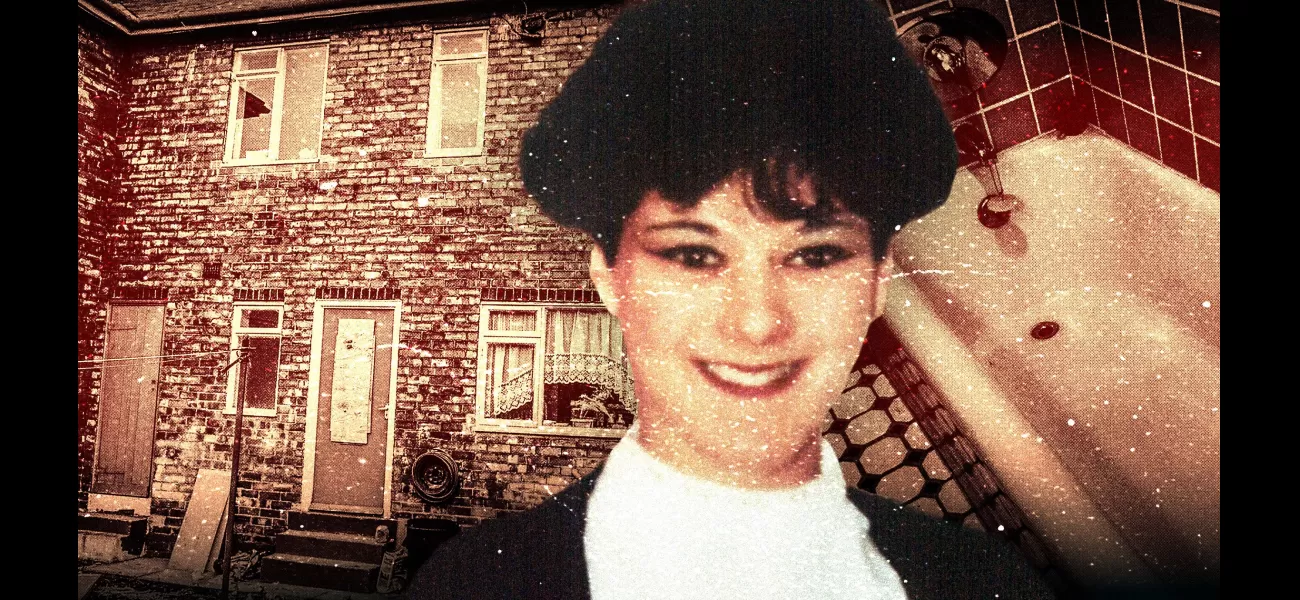A woman was discovered dead under her bathtub, resulting in a tragic situation.
"I couldn't remove the smell from my nose."
July 1st 2024.

In 1989, a young woman named Julie Hogg was tragically murdered in her own home. Her mother, Ann, knew something was wrong when Julie's phone kept ringing with no answer. As a mother, she had a gut feeling that her daughter was in danger. Julie's son, Kevin, was staying with Ann and her husband while his mother worked a late shift delivering pizzas. She was dropped off at home around 1:30am on November 16th. The next morning, when Ann called Julie and received no answer, she became even more worried. Julie lived in a tidy, three-bedroom home in Billingham, Stockton-on-Tees. It was out of character for her to be so neat, which only added to Ann's suspicion.
Ann immediately went to Julie's house and, with the help of her son, Gary, broke down the door. They searched every room, but there was no sign of Julie. Ann reported her daughter missing to the police, but they suggested she may have left on her own. However, Ann and her family were convinced that Julie would never abandon her young son. After four days of searching, the police finally agreed to investigate further.
Despite their efforts, the police found nothing amiss in Julie's home, and the missing person case was closed. Her ex-husband, Andrew, moved in with their son to provide stability for him. However, Andrew soon noticed a horrible smell in the house, which only got worse when the heating was turned on. In February 1990, Ann went to help Andrew find the source of the smell. That's when she made a horrifying discovery. Julie's body was hidden under the bath, wrapped in a blanket. She had been there for three months, and her body was badly decomposed.
Ann, who worked as a nurse at a local hospital, was devastated by the loss of her daughter. She couldn't erase the image of her daughter's lifeless body from her mind. The police, who had searched the house just feet away from Julie's body, discovered that she had been sexually assaulted before she died. Their investigation led them to a man named William "Billy" Dunlop, who had a history of violence and had previously been in a relationship with Julie. The police found Julie's house key under the floorboards of Dunlop's home, just two streets away from Julie's.
Dunlop was charged with Julie's murder, but shockingly, the jury was unable to reach a verdict. A second trial was quickly organized, but once again, the jury could not come to a decision. Dunlop was set free, much to the shock and disappointment of Julie's family. The main issue for the jury was the state of Julie's body when it was found. It was so badly decomposed that the exact cause of death could not be determined. This was a crucial factor in Dunlop's acquittal.
Diane Ivory, a former fingerprint expert and crime scene examiner, explains that there were multiple factors that contributed to Julie's body not being found sooner. The search for Julie was initially treated as a missing person's case, rather than a murder investigation. Also, the time of year and lack of heating in the house may have slowed down the decomposition process. Diane believes that if Julie's body had been found earlier, the jury may have reached a verdict sooner.
Despite escaping justice for many years, Dunlop was eventually imprisoned in 1997. However, it wasn't for Julie's murder, but for attacking his pregnant girlfriend with a toasting fork. While serving his sentence, Dunlop revealed to a prison officer that he had killed Julie nearly a decade earlier. He was able to talk about it without fear of being tried again, due to an ancient law called double jeopardy, which prevents a person from being charged for the same crime twice.
In a recorded interview with the police, Dunlop confessed to killing Julie in a fit of rage after she made fun of him for being in a fight. He was convicted of perjury for lying in his original trial, but due to double jeopardy, he could not be charged with Julie's murder. Julie's family was left heartbroken and frustrated that justice was never fully served for their beloved daughter, but they found some solace in knowing that Dunlop could never harm anyone else.
In 1989, Julie Hogg, a 22-year-old mother, was tragically murdered in her own home. Her mother, Ann, was immediately filled with worry when her daughter's phone went unanswered. She had a strong feeling that something was wrong.
On the night of November 15, Julie had been working a late shift delivering pizzas. She was dropped off at home around 1:30am by a colleague. The next morning, Ann tried calling her daughter but received no response. Concerned, she rushed to Julie's house. With the help of her son Gary, they broke down the door.
As they searched the house, Ann couldn't help but notice how tidy everything was. This was unusual for Julie, who was known to be a bit messy. Ann's suspicions were raised even more. She reported Julie missing to the police, but they initially believed she had left on her own. However, her family knew Julie would never abandon her young son, Kevin. After four days, the police finally agreed to investigate further.
Despite a thorough search of Julie's home, nothing seemed out of the ordinary. The police even took down the cordon and returned the house keys to Julie's family. Her ex-husband, Andrew, moved in with their son in an attempt to provide some stability. However, he soon noticed a foul smell that seemed to get worse when the heating was on. Three months after Julie's disappearance, Ann visited the house to help get rid of the smell. It was then that she made a horrifying discovery - Julie's decomposing body was hidden under the bath tub, wrapped in a blanket.
Ann was in shock and immediately called the police. They discovered that Julie had been sexually assaulted before her death. Their investigations led them to William 'Billy' Dunlop, who had a history of violence and was living just two streets away from Julie. They found Julie's house key hidden under the floorboards of Dunlop's home. He was charged with her murder, but shockingly, the jury was unable to reach a verdict in two separate trials. Dunlop walked free.
One of the main factors that led to this outcome was the state of Julie's body when it was found. It had been hidden for months, and the exact cause of death could not be determined. Diane Ivory, a former crime scene examiner, explained that the initial search of the house was not done as thoroughly as it would have been for a murder inquiry. This, combined with the fact that there was no smell to lead them to the body, played a significant role in the jury's decision.
Years went by, and Dunlop continued to evade justice. However, while serving a sentence for another crime, he confessed to a prison officer that he had killed Julie. He could not be charged again due to the ancient law of double jeopardy, which states that a person cannot be tried for the same crime more than once, even if new evidence is found. In a recorded interview with the police, Dunlop callously admitted to the murder, stating that he had lost control after Julie made fun of him.
Finally, in 1997, Dunlop was convicted of perjury for lying during his original trial. But due to double jeopardy, he could not be charged with Julie's murder. Julie's family was left devastated, knowing that her killer would never face justice for his heinous crime.
Ann immediately went to Julie's house and, with the help of her son, Gary, broke down the door. They searched every room, but there was no sign of Julie. Ann reported her daughter missing to the police, but they suggested she may have left on her own. However, Ann and her family were convinced that Julie would never abandon her young son. After four days of searching, the police finally agreed to investigate further.
Despite their efforts, the police found nothing amiss in Julie's home, and the missing person case was closed. Her ex-husband, Andrew, moved in with their son to provide stability for him. However, Andrew soon noticed a horrible smell in the house, which only got worse when the heating was turned on. In February 1990, Ann went to help Andrew find the source of the smell. That's when she made a horrifying discovery. Julie's body was hidden under the bath, wrapped in a blanket. She had been there for three months, and her body was badly decomposed.
Ann, who worked as a nurse at a local hospital, was devastated by the loss of her daughter. She couldn't erase the image of her daughter's lifeless body from her mind. The police, who had searched the house just feet away from Julie's body, discovered that she had been sexually assaulted before she died. Their investigation led them to a man named William "Billy" Dunlop, who had a history of violence and had previously been in a relationship with Julie. The police found Julie's house key under the floorboards of Dunlop's home, just two streets away from Julie's.
Dunlop was charged with Julie's murder, but shockingly, the jury was unable to reach a verdict. A second trial was quickly organized, but once again, the jury could not come to a decision. Dunlop was set free, much to the shock and disappointment of Julie's family. The main issue for the jury was the state of Julie's body when it was found. It was so badly decomposed that the exact cause of death could not be determined. This was a crucial factor in Dunlop's acquittal.
Diane Ivory, a former fingerprint expert and crime scene examiner, explains that there were multiple factors that contributed to Julie's body not being found sooner. The search for Julie was initially treated as a missing person's case, rather than a murder investigation. Also, the time of year and lack of heating in the house may have slowed down the decomposition process. Diane believes that if Julie's body had been found earlier, the jury may have reached a verdict sooner.
Despite escaping justice for many years, Dunlop was eventually imprisoned in 1997. However, it wasn't for Julie's murder, but for attacking his pregnant girlfriend with a toasting fork. While serving his sentence, Dunlop revealed to a prison officer that he had killed Julie nearly a decade earlier. He was able to talk about it without fear of being tried again, due to an ancient law called double jeopardy, which prevents a person from being charged for the same crime twice.
In a recorded interview with the police, Dunlop confessed to killing Julie in a fit of rage after she made fun of him for being in a fight. He was convicted of perjury for lying in his original trial, but due to double jeopardy, he could not be charged with Julie's murder. Julie's family was left heartbroken and frustrated that justice was never fully served for their beloved daughter, but they found some solace in knowing that Dunlop could never harm anyone else.
In 1989, Julie Hogg, a 22-year-old mother, was tragically murdered in her own home. Her mother, Ann, was immediately filled with worry when her daughter's phone went unanswered. She had a strong feeling that something was wrong.
On the night of November 15, Julie had been working a late shift delivering pizzas. She was dropped off at home around 1:30am by a colleague. The next morning, Ann tried calling her daughter but received no response. Concerned, she rushed to Julie's house. With the help of her son Gary, they broke down the door.
As they searched the house, Ann couldn't help but notice how tidy everything was. This was unusual for Julie, who was known to be a bit messy. Ann's suspicions were raised even more. She reported Julie missing to the police, but they initially believed she had left on her own. However, her family knew Julie would never abandon her young son, Kevin. After four days, the police finally agreed to investigate further.
Despite a thorough search of Julie's home, nothing seemed out of the ordinary. The police even took down the cordon and returned the house keys to Julie's family. Her ex-husband, Andrew, moved in with their son in an attempt to provide some stability. However, he soon noticed a foul smell that seemed to get worse when the heating was on. Three months after Julie's disappearance, Ann visited the house to help get rid of the smell. It was then that she made a horrifying discovery - Julie's decomposing body was hidden under the bath tub, wrapped in a blanket.
Ann was in shock and immediately called the police. They discovered that Julie had been sexually assaulted before her death. Their investigations led them to William 'Billy' Dunlop, who had a history of violence and was living just two streets away from Julie. They found Julie's house key hidden under the floorboards of Dunlop's home. He was charged with her murder, but shockingly, the jury was unable to reach a verdict in two separate trials. Dunlop walked free.
One of the main factors that led to this outcome was the state of Julie's body when it was found. It had been hidden for months, and the exact cause of death could not be determined. Diane Ivory, a former crime scene examiner, explained that the initial search of the house was not done as thoroughly as it would have been for a murder inquiry. This, combined with the fact that there was no smell to lead them to the body, played a significant role in the jury's decision.
Years went by, and Dunlop continued to evade justice. However, while serving a sentence for another crime, he confessed to a prison officer that he had killed Julie. He could not be charged again due to the ancient law of double jeopardy, which states that a person cannot be tried for the same crime more than once, even if new evidence is found. In a recorded interview with the police, Dunlop callously admitted to the murder, stating that he had lost control after Julie made fun of him.
Finally, in 1997, Dunlop was convicted of perjury for lying during his original trial. But due to double jeopardy, he could not be charged with Julie's murder. Julie's family was left devastated, knowing that her killer would never face justice for his heinous crime.
[This article has been trending online recently and has been generated with AI. Your feed is customized.]
[Generative AI is experimental.]
0
0
Submit Comment





